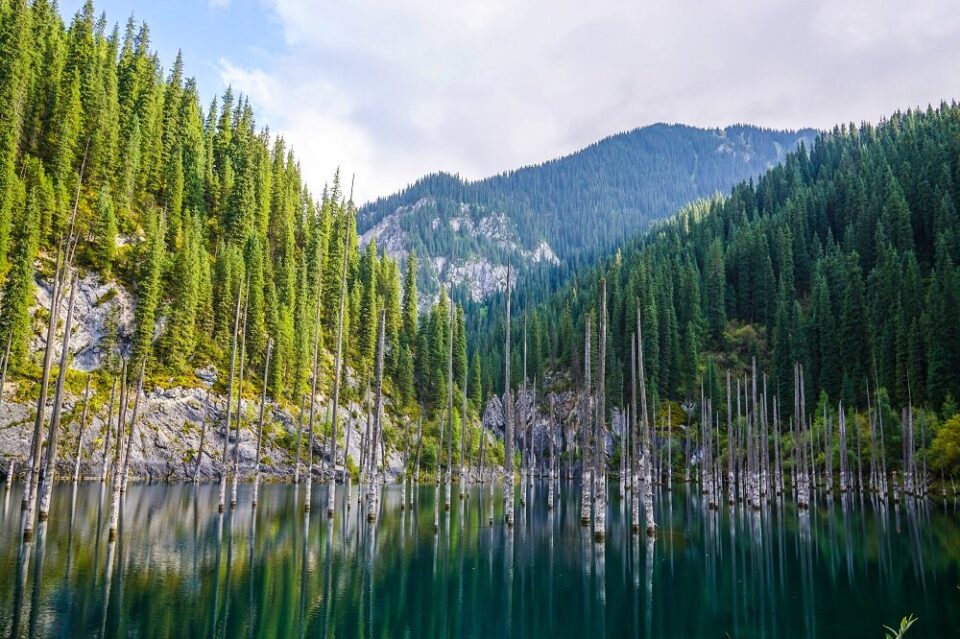On the surface of Kaindy Lake, the spruce forest resembles the masts of ghost boats, but under the water are dense branches.
Kaindy is a lake on the Tian Shan Mountain, about 130 km east of Almaty – the largest city in Kazakhstan. The 1911 earthquake caused a huge limestone landslide that resulted in a natural dam. Rainwater from the surrounding cliffs and valleys flowing here creates water sources to form Kaindy Lake at an elevation of about 2000m. After hundreds of years, the lake is 400 m long and the deepest place is 30 m.
The lake is famous for its white spruce trunks that appear to rise in the middle of the lake, but the trees actually existed before the water was flooded here. This spruce forest, combined with the turquoise water of Kaindy Lake, creates an astonishing natural spectacle that is rare all over the world. And unlike the barrenness above the lake, the very well-living spruces create the dense forest just below the water’s surface.
Due to its high mountain location, the water in Kaindy Lake is cold year round, the highest temperature that can be measured is 6 degrees C in summer. Lucky for you, the water in Kaindy Lake is always clear, so it’s easy to stand on the shore looking at the bottom without necessarily swimming or diving.
If you come here in winter, the water in Kaindy Lake is completely frozen, spruce trees emerging on the surface of the water look like the masts of ghost ships. The scene is more magical and attractive when there is a light fog around. However, during the day, unwary tourists can fish the lake ice or travel, ski, or even scuba dive to admire the lake.
Surprisingly, this area is still little known to tourists despite its proximity to a city of 1.5 million inhabitants of Almaty. It is possible that Kaindy Lake is not as famous as other lakes in the same area as Bolshoe Almatinskoe and Kolsay. Also, Kaindy Lake is hidden in a canyon and visitors have to take a very bumpy and dusty road to get there.
You can drive to the lake by autonomous car, park in the parking lot 2 km from the lake and cross the dusty and rocky road. Although the last stage is difficult to go, you have a great view on both sides, the right is a forest and a green lake, the left will lead to a large land suitable for overnight camping.
Visitors to Kaindy to explore often only have the option of sleeping in tents, camping around the lake. If you have an independent means of transport, you can stay with host families in the village of Saty, 12 km from the lake. The price for one night is 4000 tenge / person including breakfast, if you need both lunch and dinner you will pay an additional 1000 tenge / meal.
Before entering the lake, visitors must pay 727 tenge / person and 1000 tenge / car. If you stay in Kaindy and sleep in tents it costs 350 tenge / tent extra. Remember to ask for an invoice to avoid losing your money again and note that campfires near the lake are prohibited
You can drive to the lake by autonomous car, park in the parking lot 2 km from the lake and cross the dusty and rocky road. Although the last stage is difficult to go, you have a great view on both sides, the right is a forest and a green lake, the left will lead to a large land suitable for overnight camping.
Visitors to Kaindy to explore often only have the option of sleeping in tents, camping around the lake. If you have an independent means of transport, you can stay with host families in the village of Saty, 12 km from the lake. The price for one night is 4000 tenge / person including breakfast, if you need both lunch and dinner you will pay an additional 1000 tenge / meal.
Before entering the lake, visitors must pay 727 tenge / person and 1000 tenge / car. If you stay in Kaindy and sleep in tents it costs 350 tenge / tent extra. Remember to ask for an invoice to avoid losing your money again and note that campfires near the lake are prohibited


